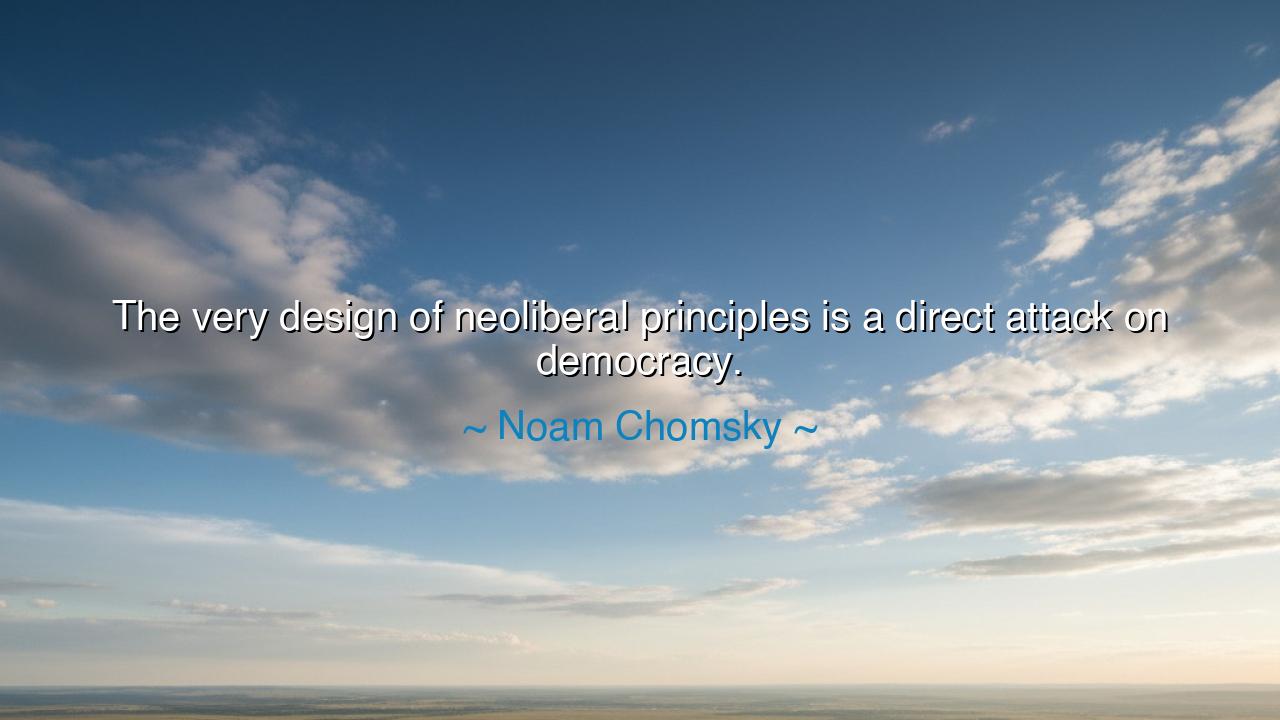
The very design of neoliberal principles is a direct attack on






In the grave and discerning voice of a scholar who has spent a lifetime unveiling the veiled, Noam Chomsky once declared: “The very design of neoliberal principles is a direct attack on democracy.” These words, forged in the crucible of political thought and historical observation, are not merely a condemnation of an ideology—they are a warning, carved into the tablets of our modern age. Chomsky, a linguist turned philosopher of conscience, speaks here as the ancient prophets once did: not against a single ruler or nation, but against a system of thought that disguises domination as freedom, and greed as progress. His words call upon us to awaken, to remember that democracy is not sustained by wealth or slogans, but by the vigilant participation of free and informed citizens.
To understand the origin of this quote, one must understand Chomsky’s lifelong critique of neoliberalism—the economic and political doctrine that rose to dominance in the late twentieth century. Beginning with the regimes of Ronald Reagan in the United States and Margaret Thatcher in the United Kingdom, neoliberalism promised prosperity through privatization, deregulation, and the shrinking of the public sphere. It preached that the invisible hand of the market could solve all human ills, and that government should retreat from its role as protector of the common good. But behind this doctrine, Chomsky saw not liberation, but consolidation—a shifting of power from the many to the few, from citizens to corporations, from public interest to private gain. Thus, he called neoliberalism not a misstep, but a design—a structure built deliberately to erode the very foundations of democratic life.
Chomsky’s words are rooted in history’s harshest lessons. Time and again, societies that worship profit above justice have fallen into tyranny. The ancients, too, warned of this danger. Aristotle, in his treatise on politics, spoke of the decay of democracy into oligarchy, when the rich rule not for the good of all but for themselves. So it was in the late Roman Republic, when wealth and empire corroded civic virtue, and senators traded their duties for privilege until the republic collapsed into dictatorship. Chomsky’s insight is the echo of that same ancient truth: when economic power becomes unaccountable, political freedom withers. Democracy dies not with the roar of war, but with the quiet sell of influence.
One need only look to the modern world to see how this prophecy unfolds. Under the rule of neoliberal principles, public institutions—schools, hospitals, water, housing—are treated not as rights but as commodities. Citizens are redefined as consumers, their voices drowned in the marketplace of advertising and money. In the name of efficiency, governments hand over power to unelected financial interests. In the name of freedom, corporations dictate the terms of labor, speech, and even thought. Thus, Chomsky declares that the attack is by design—for the architects of neoliberalism understood that to govern a democracy is difficult, but to control a market disguised as democracy is easy.
And yet, Chomsky’s words are not spoken in despair, but in resistance. For he believes that awareness is the first act of liberation. To expose the design is to weaken its power. He reminds us that democracy is not a gift but a practice, a living covenant that must be renewed in every generation. It is not sustained by kings or markets, but by ordinary people—teachers, workers, students, parents—who refuse to be silent when truth is threatened. In every age, there have been those who stood against the machinery of exploitation: the abolitionists who broke the chains of slavery, the suffragists who won the right to vote, the laborers who fought for fair wages. They, too, faced systems designed to suppress them, and yet they prevailed, because they remembered that the moral strength of the people is greater than the wealth of the few.
Chomsky’s warning, then, is not merely about economics—it is about the soul of civilization. He asks us to recognize that freedom cannot exist where inequality reigns, and that justice cannot grow in soil poisoned by greed. True democracy is not the freedom of the powerful to do as they wish, but the empowerment of all to live with dignity. It is the belief that the marketplace must serve humanity, not the reverse. When the people withdraw from civic life, when they surrender their attention to spectacle and consumption, they allow the merchants of power to rewrite the laws of their freedom. But when the people rise, when they speak, organize, and demand accountability, the design of oppression begins to crack.
So let this be your lesson, O listener of truth: guard your democracy as you would guard your own heart. Question the voices that promise freedom while selling obedience. Defend education, journalism, and public discourse, for they are the lifeblood of awareness. Refuse to believe that markets can measure the worth of a soul, or that profit can replace compassion. In your hands lies the same duty that guided Chomsky’s words—the duty to resist the quiet conquest of the mind. For as he teaches us, when we expose the design of domination, we reclaim the blueprint of freedom. And in doing so, we keep alive the sacred flame of democracy—not as a relic of the past, but as a living promise for the generations yet to come.






AAdministratorAdministrator
Welcome, honored guests. Please leave a comment, we will respond soon